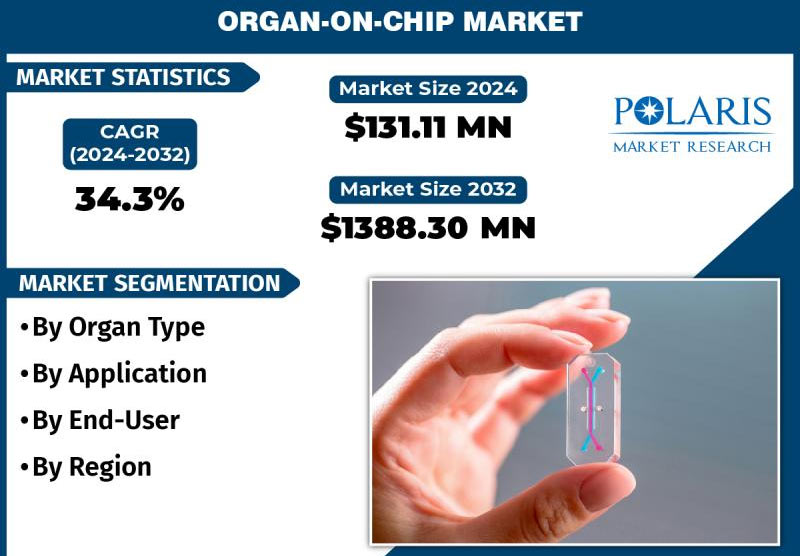Organ-on-chip market for drug testing expected to see tenfold growth to $1.3 billion by 2032

Demand for organs-on-chips is expected to skyrocket in the coming years, especially as many governments are starting to limit animal testing for developing drugs and pharmaceutical products. According to a press release by Polaris Market Research, the drug discovery segment is the number one consumer of organ-on-chip technology, as they use it to replicate human organ functions while developing medicines. However, other industries are increasingly interested in the use of this technology.

Organs-on-chips have advanced to the point that we have multi-organ-on-chip systems that can act as multiple organs. Researchers can use these combination chips to see how these distinct structures interact and communicate when exposed to a substance. For example, cosmetic companies could use human skin, hair, and eye chips to check how the human body could physically react when exposed to their final product.
Aside from the drug discovery and cosmetic industries, other applications for organ-on-chip technologies include toxicology, stem cell research, and even tissue regeneration studies. However, we’re not yet at the level where you can get a chip replacement for your pancreas from Intel or TSMC. However, it is interesting to see that a few studies, like one published by the National Center for Biotechnology Information, are looking at such applications.
Integrating technology and human biology
These advancements are helping us integrate technology with human biology, much like how a Swiss startup built a bioprocessor or a chip powered by 16 human brain organoids. Even Elon Musk is in on the trend with Neuralink, with its first human implantee able to move a computer mouse and play Civilization VI with just his thoughts. China is also reportedly developing a competitor with Beijing Xinzhida Neurotechnology unveiling its Neucyber brain interface tech a couple of months back.
Nevertheless, integrating chips and other digital tech directly into the human body is still far off in the future. The human brain is so advanced that even just 1 cubic mm scan of brain tissue yielded 1.4 PB of data. Aside from this complexity, we still have several hurdles to go through to ensure that these are safe for use. We also must deal with the complex issue of the ethical use of these technologies on human bodies. And last, but definitely not least, there’s also the dystopian future of cybernetically enhanced humans that Hollywood loves to show us, so we should think about that, too.
Get Tom's Hardware's best news and in-depth reviews, straight to your inbox.

Jowi Morales is a tech enthusiast with years of experience working in the industry. He’s been writing with several tech publications since 2021, where he’s been interested in tech hardware and consumer electronics.
-
A Stoner Are you sure your math is correct... going from 131 million to ten times, is 1.31 billion, not trillion...Reply -
bigdragon Imagine...a future where you can walk into Micro Center and get a new part installed in yourself. No more paying Pfizer for the rest of your life to manage something.Reply
Hollywood was wrong -- Arnold is not going to try and kill us all. Bring on the cyborgs! Save the beagles? Organ on a chip is cool tech assuming it works. This is like Star Trek Voyager tech in real life. Stop wasting money on integrating AI into places where it's not needed and fund this research! -
JarredWaltonGPU Reply
Fixed, someone made a math oopsie.A Stoner said:Are you sure your math is correct... going from 131 million to ten times, is 1.31 billion, not trillion... -
oofdragon Reply
It's all fun until the chip installed in your body gets hackedbigdragon said:Imagine...a future where you can walk into Micro Center and get a new part installed in yourself. No more paying Pfizer for the rest of your life to manage something.
Hollywood was wrong -- Arnold is not going to try and kill us all. Bring on the cyborgs! Save the beagles? Organ on a chip is cool tech assuming it works. This is like Star Trek Voyager tech in real life. Stop wasting money on integrating AI into places where it's not needed and fund this research!